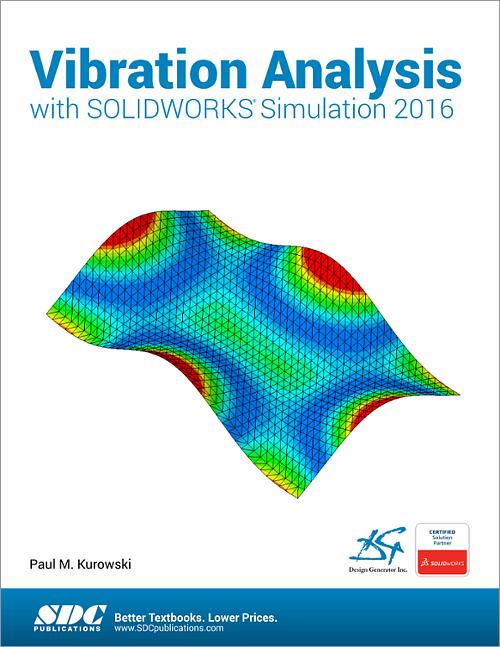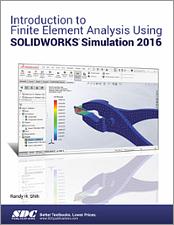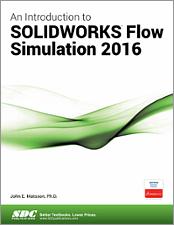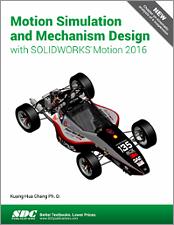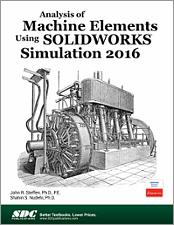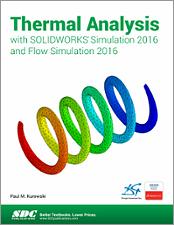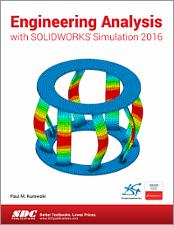Vibration Analysis with SOLIDWORKS Simulation 2016
- Description
- Contents
- Downloads
- Instructor Resources
- Details
Description
Key Features
- Introduces you to both vibration analysis and its implementation in SOLIDWORKS Simulation 2016
- Covers all types of vibration analysis available in SOLIDWORKS Simulation
- Uses hands on exercises that build on one another throughout the book
- Designed for users already familiar with Finite Element Analysis using SOLIDWORKS Simulation
In Detail
Vibration Analysis with SOLIDWORKS Simulation 2016 goes beyond the standard software manual. It concurrently introduces the reader to vibration analysis and its implementation in SOLIDWORKS Simulation using hands-on exercises. A number of projects are presented to illustrate vibration analysis and related topics. Each chapter is designed to build on the skills and understanding gained from previous exercises.
Vibration Analysis with SOLIDWORKS Simulation 2016 is designed for users who are already familiar with the basics of Finite Element Analysis (FEA) using SOLIDWORKS Simulation or who have completed the book Engineering Analysis with SOLIDWORKS Simulation 2016. Vibration Analysis with SOLIDWORKS Simulation 2016 builds on these topics in the area of vibration analysis. Some understanding of structural analysis and solid mechanics is recommended.
Topics Covered
- Differences between rigid and elastic bodies
- Discrete and distributed vibration systems
- Modal analysis and its applications
- Modal Superposition Method
- Modal Time History (Time Response) analysis
- Harmonic (Frequency Response) analysis
- Random Vibration analysis
- Response Spectrum analysis
- Nonlinear Vibration analysis
- Modeling techniques in vibration analysis
Table of Contents
- Before you start
- Introduction to vibration analysis
- Introduction to modal analysis
- Modal analysis of distributed systems
- Modal analysis – the effect of pre-stress
- Modal analysis - properties of lower and higher modes
- Modal analysis – mass participation, properties of modes
- Modal analysis – mode separation
- Modal analysis of axi-symmetric structures
- Modal analysis – locating structurally weak spots
- Modal analysis – a diagnostic tool
- Time response and frequency response of discrete systems
- Harmonic base excitation of distributed systems
- Omega square harmonic force excitation
- Time response analysis, resonance, beating
- Vibration absorption
- Random Vibration
- Response Spectrum analysis
- Nonlinear vibration
- Vibration benchmarks
- Glossary of terms
- References
- List of exercises
Downloads
For additional information on downloading, unzipping, and using these files visit the downloads section on our Frequently Asked Questions page.
Instructor Resources
The following downloadable resources require that you are registered, logged in and have been authenticated as an instructor.
Product Details
| Publisher | SDC Publications |
| Authors | Paul Kurowski Ph.D., P.Eng. |
| Media Types | Print Book, eBook |
| Primary Languages | English |
| Published | May 19, 2016 |
| User Level | Intermediate - Advanced |
| Pages | 346 |
| Binding | Paperback |
| Printing | Black and White |
| Print ISBN | 978-1-63057-012-5 |
| Print ISBN 10 | 1630570125 |
| eBook ISBN | 978-1-63056-307-3 |
